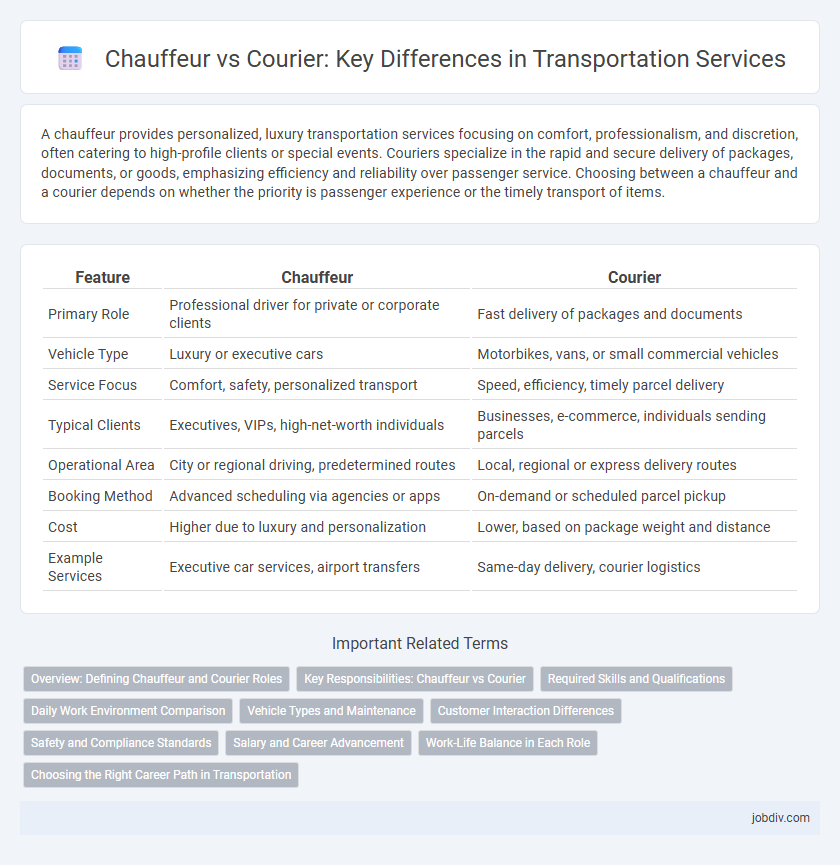A chauffeur provides personalized, luxury transportation services focusing on comfort, professionalism, and discretion, often catering to high-profile clients or special events. Couriers specialize in the rapid and secure delivery of packages, documents, or goods, emphasizing efficiency and reliability over passenger service. Choosing between a chauffeur and a courier depends on whether the priority is passenger experience or the timely transport of items.
Table of Comparison
| Feature | Chauffeur | Courier |
|---|---|---|
| Primary Role | Professional driver for private or corporate clients | Fast delivery of packages and documents |
| Vehicle Type | Luxury or executive cars | Motorbikes, vans, or small commercial vehicles |
| Service Focus | Comfort, safety, personalized transport | Speed, efficiency, timely parcel delivery |
| Typical Clients | Executives, VIPs, high-net-worth individuals | Businesses, e-commerce, individuals sending parcels |
| Operational Area | City or regional driving, predetermined routes | Local, regional or express delivery routes |
| Booking Method | Advanced scheduling via agencies or apps | On-demand or scheduled parcel pickup |
| Cost | Higher due to luxury and personalization | Lower, based on package weight and distance |
| Example Services | Executive car services, airport transfers | Same-day delivery, courier logistics |
Overview: Defining Chauffeur and Courier Roles
Chauffeurs provide professional driving services, often focusing on luxury, comfort, and personalized transportation in high-end vehicles for clients such as executives or celebrities. Couriers specialize in the expedited delivery of documents, packages, and freight, prioritizing speed and reliability to ensure timely arrivals. Both roles demand knowledge of local routes and traffic patterns but serve distinct purposes within the transportation industry.
Key Responsibilities: Chauffeur vs Courier
A chauffeur is responsible for providing personalized, luxury transportation services, ensuring timely arrivals, vehicle maintenance, and passenger comfort, often catering to executives or VIP clients. In contrast, a courier specializes in the secure and prompt delivery of documents, packages, or parcels, managing route optimization and handling time-sensitive materials. Both roles require strong navigation skills but differ significantly in their focus on passenger service versus item delivery.
Required Skills and Qualifications
Chauffeurs require advanced driving skills, excellent knowledge of traffic laws, and often a professional chauffeur license, emphasizing customer service and discretion for transporting clients safely and comfortably. Couriers prioritize efficient time management, navigation skills, and physical stamina to deliver packages quickly and accurately, typically requiring a valid driver's license and familiarity with delivery technologies. Both roles demand strong attention to detail and reliability but vary significantly in their service focus and operational environments.
Daily Work Environment Comparison
Chauffeurs typically operate luxury vehicles, providing personalized, high-end transportation services primarily for executives or VIP clients, often working in urban or airport settings. Couriers focus on timely delivery of packages and documents across cities, utilizing efficient route planning and often handling multiple stops in diverse environments such as commercial districts and residential areas. Chauffeurs maintain a client-centered atmosphere with scheduled trips, while couriers prioritize speed and logistics under variable daily conditions.
Vehicle Types and Maintenance
Chauffeurs typically operate luxury vehicles such as sedans, limousines, and high-end SUVs that require meticulous maintenance to ensure comfort and reliability for clients. Couriers generally use smaller, more practical vehicles including motorcycles, vans, or compact cars designed for efficient, frequent deliveries with a focus on durability and cost-effective upkeep. Vehicle maintenance for chauffeurs emphasizes appearance and ride quality, while courier vehicle maintenance prioritizes mechanical reliability and rapid turnaround times.
Customer Interaction Differences
Chauffeurs provide personalized, high-touch customer service, often engaging in tailored conversations and anticipating client needs to ensure a luxury experience. Couriers prioritize efficiency and speed in deliveries, with minimal direct interaction, focusing primarily on accurate and timely package handoffs. Chauffeur roles emphasize relationship-building and comfort, whereas couriers concentrate on logistics and precise transaction execution.
Safety and Compliance Standards
Chauffeurs adhere to stringent safety protocols and compliance standards, including specialized driver training, background checks, and vehicle inspections to ensure passenger security and regulatory adherence. Couriers operate under regulations focused on package handling and timely delivery, with varying safety requirements depending on the delivery mode and cargo type. The emphasis on personalized safety measures and legal compliance is typically more rigorous in chauffeur services due to direct passenger responsibility.
Salary and Career Advancement
Chauffeurs typically earn an average salary ranging from $30,000 to $60,000 annually, with opportunities for career advancement into executive driver or fleet manager roles. Couriers often have lower average salaries, approximately $25,000 to $40,000 per year, but can advance to logistics coordinator or dispatch supervisor positions. Salary growth for chauffeurs is generally higher due to specialized skills and client relations, whereas couriers benefit from scalable roles in supply chain management.
Work-Life Balance in Each Role
Chauffeurs typically enjoy more predictable schedules, which supports a healthier work-life balance compared to couriers who often face irregular, high-pressure delivery deadlines. Couriers experience increased stress due to time-sensitive packages and frequent traffic challenges, impacting their personal time negatively. Employers offering flexible shifts and route optimization software can improve work-life balance in both roles.
Choosing the Right Career Path in Transportation
Choosing between a chauffeur and courier career in transportation depends on personal preferences and skills; chauffeurs prioritize luxury, comfort, and personalized service to high-profile clients, while couriers focus on speed, reliability, and efficient delivery of packages or documents. Chauffeurs often require advanced driving skills, knowledge of routes, and discreet professionalism, whereas couriers benefit from time management, navigation skills, and handling multiple deliveries per day. Understanding job demands, work environment, and growth opportunities helps in selecting the right transportation career path.
Chauffeur vs Courier Infographic

 jobdiv.com
jobdiv.com